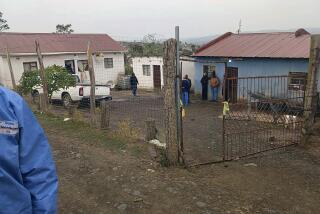3 Bombs Rock S. Africa Port : Durban Oil Pipeline, Chemical Plant Hit
- Share via
JOHANNESBURG, South Africa — Three bomb explosions shook the port city of Durban early Sunday in what appeared to be a determined effort by the outlawed African National Congress to show that the government cannot put its guerrilla units out of action.
The blasts hit an oil refinery pipeline, a chemical plant and the street near a downtown movie theater. No one was injured, but damage appeared to be extensive after fires raged through the night until dawn.
Meanwhile, a senior police officer in the nominally independent South African tribal homeland of Bophuthatswana was assassinated, gunned down by men lying in wait outside the home of a friend he was visiting at Winterveld, about 25 miles northwest of Pretoria.
Brigadier Andrew Molope had commanded the police who opened fire March 26 on about 5,000 anti-government demonstrators in Winterveld, killing 11 people and wounding many. His murder was one of the boldest yet carried out by anti-government guerrillas.
Another man was reported killed in Soweto outside Johannesburg when he was set upon by a mob and beaten to death, apparently as a suspected police informer.
The three explosions in Durban followed by a week a car bomb explosion on the city’s beachfront that killed three women and injured 69 other people, most of them whites, in an earlier apparent effort by the African National Congress to show its strength.
Although congress headquarters in Lusaka, Zambia, did not claim responsibility immediately for Sunday’s sabotage in Durban, its guerrillas have planted most of the bombs that have exploded in that area in recent years. And it has warned repeatedly over the last year that it intended to intensify its attacks to put greater pressure on the white-led minority government.
Refinery Threatened
One bomb caused secondary explosions and set a large fire that burned for several hours around oil storage tanks and for a time threatened an oil refinery south of town near Durban’s international airport. Oil leaked into the sea from the ruptured pipeline, closing a number of the city’s beaches.
The bomb at the chemical plant in an industrial area caused another fire and a heavy spillage of industrial chemicals. Efforts were under way to clean it up.
In central Durban, an explosion in a trash bin near a theater broke windows in nearby stores and brought hundreds of people into the streets, fearing that there had been another car bomb.
The government’s information bureau, the only source of news on the continuing unrest and the state of emergency in South Africa, described all three explosions as “minor.”
“You simply cannot prevent this type of terrorism, however extensive your precautions,” a spokesman said. “We are happy that the damage was limited and that there were no causalties.”
The full extent of the damage was difficult to assess, because police barred reporters from the areas under existing emergency regulations that severely restrict news coverage.
Killed by Rifle Fire
Few details were available on the assassination of Brigadier Molope, cut down by AK-47 rifle fire about 8 p.m. Saturday a few yards from the home of a friend in the Beirut section of Winterveld, a sprawling squatter settlement.
Col. David George, the Bophuthatswana police spokesman, said that an intense investigation has begun and a hunt for the killers is under way.
Feelings have run high in Winterveld since police under Molope’s command fired upon an anti-government rally at a sports field in March, and repeated clashes between demonstrators and the police have occurred since then.
Molope, a divisional commander at the time of the incident, was later promoted from colonel to brigadier by Bophuthatswana President Lucas Mangope, increasing the outrage in Winterveld over the March shooting. Bophuthatswana’s independence is recognized only by South Africa.
Molope’s slaying, if it was carried out by guerrillas of the African National Congress, is likely to bring that black nationalist organization even broader support in the area. Three similar killings--that of a political figure from the Kangwane tribal homeland last month and those earlier of a police detective and a black prison guard--have been attributed to African National Congress guerrillas operating in the Pretoria area.
Barred From Burned Areas
In Cape Town, Brigadier Christoffel A. Swart, the regional police commander, barred anyone from returning to the burned-out areas of the nearby Crossroads squatter settlement in a move to prevent residents from rebuilding their shacks in the devastated shantytown.
The area is being cleared, government spokesmen explained, and residents will be resettled in Khayelitsha, a new black township farther from Cape Town. Those who took refuge in churches, mosques and community halls have been ordered to move to Khayelitsha today.
More than 70,000 Crossroads squatters were left homeless in fighting during the past month between conservative black vigilantes and more militant young blacks, while thousands of shacks were razed.
Business leaders met over the weekend with Louis le Grange, the minister of law and order, to seek a resolution of rapidly spreading strikes by thousands of black workers protesting the detention of dozens of labor union leaders under the state of emergency, which was imposed June 12.
Le Grange said he will look into the situation but stressed that the government’s current priority is the maintenance of order.
More to Read
Sign up for Essential California
The most important California stories and recommendations in your inbox every morning.
You may occasionally receive promotional content from the Los Angeles Times.













